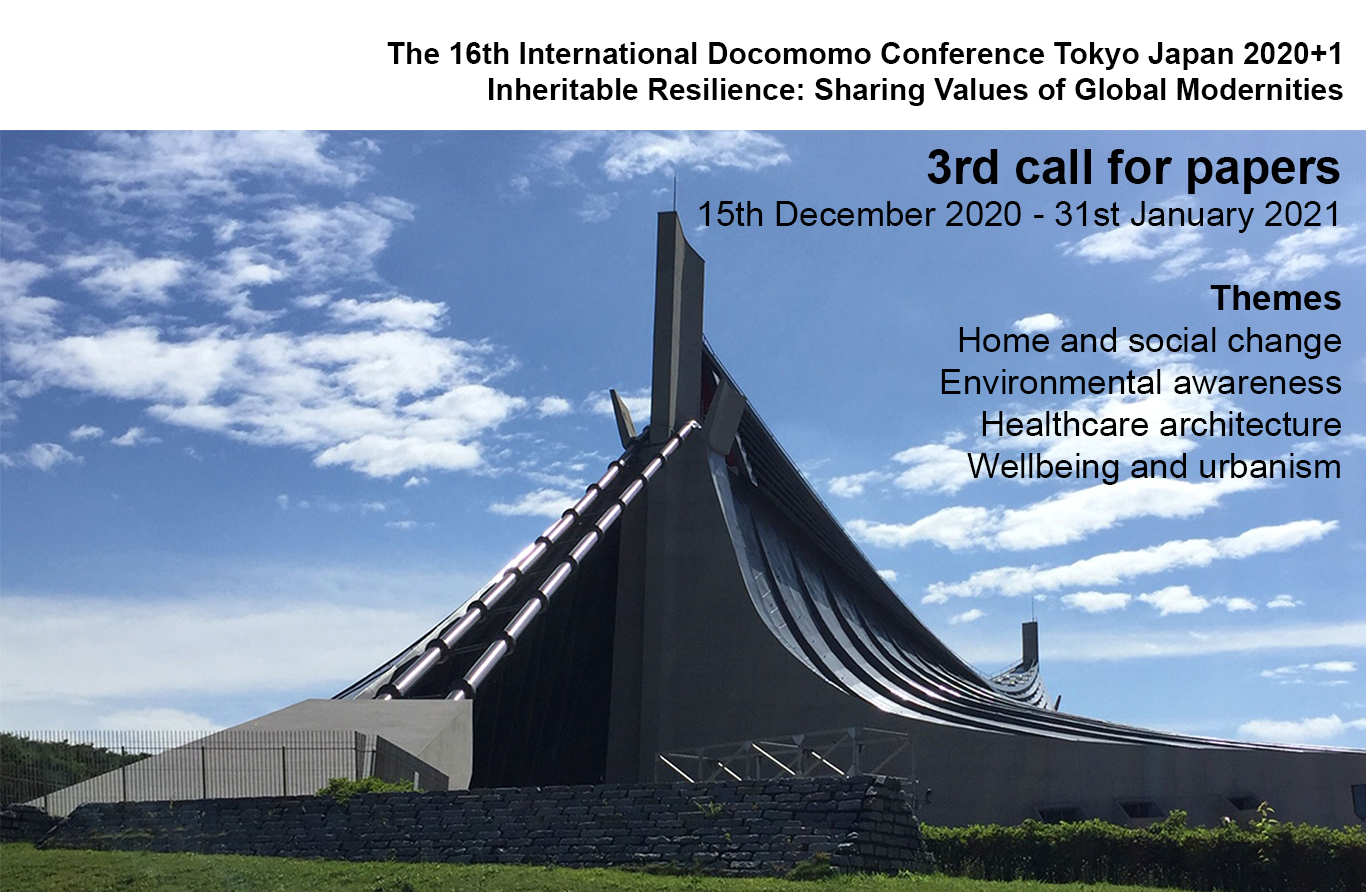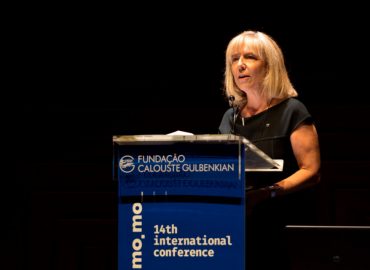Docomomo International invites researchers and practitioners involved in the process of preservation, conservation, renovation or transformation of buildings, sites and neighborhoods of the Modern Movement, to investigate on the theme: Inheritable Resilience: Sharing Values of Global Modernities.
Application of the third round call for papers is open from December 15, 2020 until 31 January of 2021.
We are now accepting new applications for the following new themes:
13. Home and social change
14. Environmental awareness
15. Healthcare architecture
16. Wellbeing and urbanism
IMPORTANT NOTICE:
The 2020+1 conference will be held with hybrid format, through a mixed system between online and PRESENTIAL lectures.Authors can present their papers with pre-recorded video presentations. At the real-time conference, the video recording will be broadcasted at the scheduled place and time. The authors for presenting physically in Tokyo are welcome. The digital proceedings will be published in 2021 before the conference including both online and alive presentations.
Presentations
Sessions will consist of four papers, followed by 20-minute-discussion time. Each paper should be in English and take no more than 20 minutes to present. Conference papers will be published digitally in the conference proceedings.
New Sessions:
13. Home and social change
Post-industrial society has brought changes in our way of living that have had repercussions in the occupation of the dwelling space: consumerism and individualism have grown as new paradigmatic lifestyles; new communication systems have been developed allowing increasingly diverse ways of working; households are no longer exclusively composed of nuclear families; sharing and temporary forms of housing are increasingly common; and people relate to each other at a distance – a condition that Covid-19 has reinforced. It has become important to promote spatial occupations not envisaged when the buildings were conceived, and to address flexibility of use to accommodate current lifestyles and raise levels of satisfaction. This session aims to consider how modern dwellings have responded to different ways of living, from their conception, up to the present day. More than six or seven decades later, are modern dwellings resilient or obsolete? How can modern housing sites and neighbourhoods be preserved while meeting contemporary concepts of comfort, in a continuously changing context of socio-cultural values?
Keywords: modern housing, modern house, dwelling, home, family, diversity of households, lifestyles, social change, housing sharing, temporary housing, telework, spatial occupation, globalization, identity, reuse, renovation, …
14. Environmental awareness
The world is experiencing an unprecedented environmental crisis as well as in the framework of the pandemic covid consequences. Buildings have been identified as being responsible for half of worldwide energy consumption, greatly contributing to global warming and the disruption of natural ecosystems. Modern architecture was renowned for championing technological advancement in pursuit of building a better world. Today we are more aware of the impact of construction and of the scarcity of resources. Did modern architects foresee this situation? How are contemporary architects dealing with these questions in projects to renovate modern buildings? This session seeks contributions that shed light on the development of Modern Movement projects that had the foresight to use passive forms of energy-saving and local resources and knowledge; or that highlight ecologically-responsible renovations of modern buildings that respond to the challenges posed by the current climate crisis.
Keywords: sustainability, environment, energy, climate responsiveness, ecological responsibility, design with climate, technology, materials, local materials and techniques, traditional culture, local modernisms, regionalism, restoration, renovation, reuse, …
15. Healthcare architecture
As the relationship between illness and the built environment is undoubtedly a critical topic, architecture and medicine have always been tightly interlinked. Hospital architecture is a symbol of the modern movement, and one of the most important contributors to the establishment of the formal, technical and spatial codes of its architecture. The interpretation of buildings as “health machines” significantly influenced modern architects such as Le Corbusier and Tony Garnier. They both designed buildings able to admit sunlight and fresh air, due to a concern for the health of the occupants. The challenge of hospital heritage is perhaps the largest and most complex in the history of modern architecture. Responding to the health necessities of a certain time, healthcare buildings are subject to permanent transformations, deactivation, or even being demolished if they are seen as obsolete and unsuitable for today’s functional and programmatic requirements. For this reason, thinking about health architecture as a space for memory is almost a paradox, because it is a typology that has traversed the 20th century in a process of constant evolution that is still ongoing. Hence, this discussion is not only important to safeguard memory, but also to claim a social, cultural and economically-sustainable future for these innovative facilities that have witnessed the passing of one hundred years.
Keywords: healthcare, hospitals, sanatoriums, heritage, technology, healthcare design, construction, sustainability, ventilation, renovation, reuse, sustainability, environment, life culture, …
16. Wellbeing and urbanism
With the swift advances of sciences and technology, in the last 50 years, society has experienced a rapid development, with the evolution of knowledge, healthcare and education contributing significantly to an improvement in living conditions in terms of hygiene and salubriousness. All this was made possible by modernity’s devotion to innovation in science and technology. The investigation of healthcare facilities and cities involves dealing with multiple spheres beyond the technological, physical and psychological. Nowadays, the growing emphasis on wellbeing goes beyond the seminal ideas that modern buildings were cleansing machines, or that modern architecture and urbanism were shaped by bacteria. As health becomes a central focus of political debate, the question arises whether architects, engineers and planners are able to follow the social and medical experts, in seeking a new disciplinary and political agenda to deal with innovations in medical science and technology. Living through the current COVID-19 pandemic, the concerns of architecture and health facilities are once again addressing the realm of “hygiene”. This session seeks both contributions revealing pioneering Modern Movement solutions for improving wellbeing in the conception of urban settlements, and reflections on the sustainable future of our built environment with regards to contemporary challenges.
Keywords: globalization, environment, urban planning, education, urbanism, heritage, technology, traffic, construction, sustainability, ventilation, social space, renovation, reuse, sustainability, environment, life culture, …
Note
- If your paper is already accepted, you are not eligible to apply for this round of application.
- If you are accepted for the poster session and already submitted your poster, you are eligible to apply. There is no need for an additional fee.
- If your paper is accepted and would like to publish in the conference proceedings, prospective authors and all co-authors need to register and pay registration fee regardless of conference participation.
- After the paper is accepted, you are not allowed to change authors and co-authors. Please be careful.
Cal for Papers’s Schedule
15 December 2020 – 31 January 2021: Third Round Call for Papers solicitation
15 February 2021: Third Round Call for Papers Call for paper’s notification of acceptance
15 March 2021: Deadline for the payment registration
31 March 2021: Full paper submission deadline (1st version)
30 April 2021: Deadline for session chairs to return papers with comments to the speakers
20 May 2021: Full paper submission deadline (final version)
29 August 2021: 16th International Docomomo Conference Opening reception
30 August – 2 September 2021: 16th International Docomomo Conference
Please go to the website to find more info: www.docomomo2020.com





